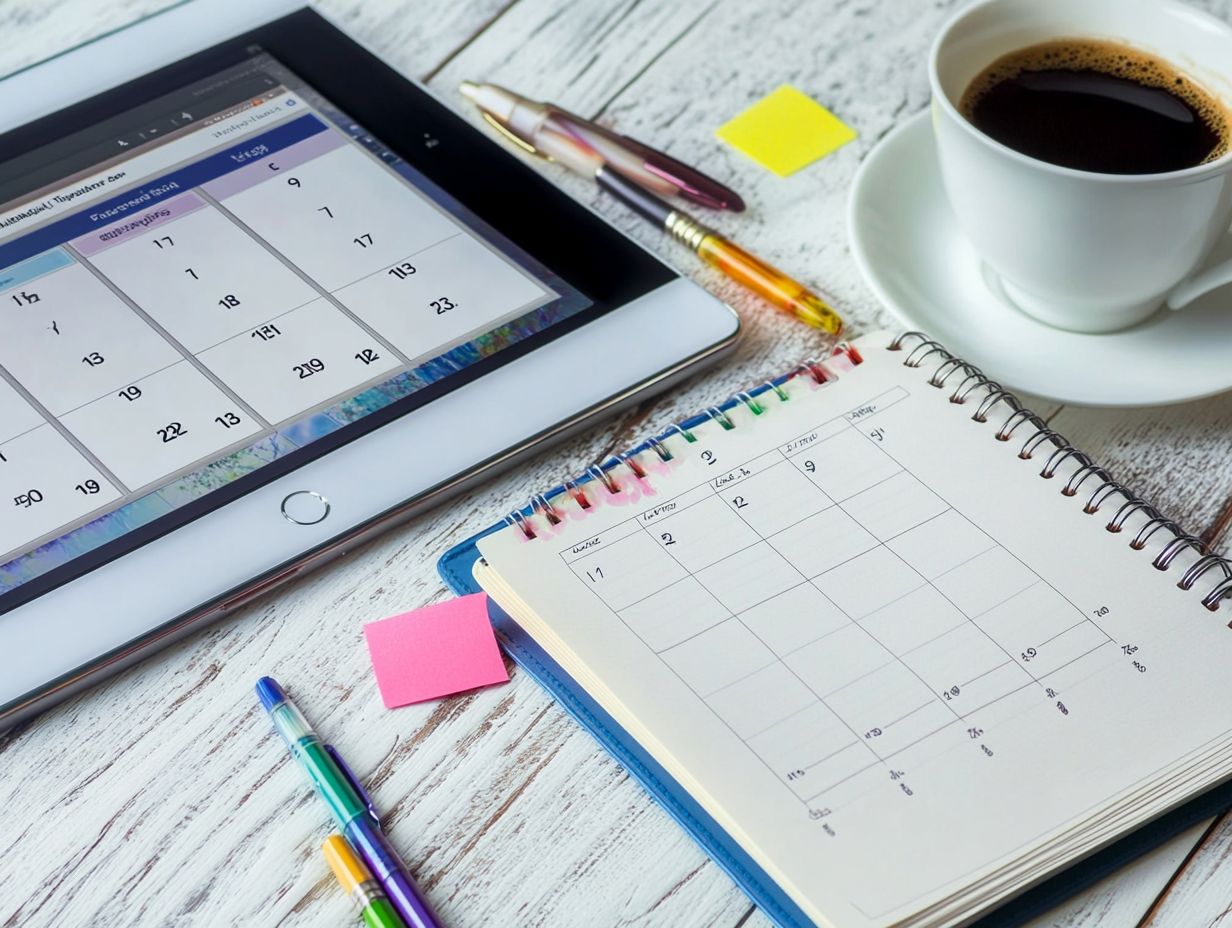Using Calendars for Better Time Management
In today s fast-paced world, mastering effective time management is crucial for achieving both personal and professional goals. With countless demands vying for your attention, honing your scheduling skills can truly transform your experience.
This article delves into the significance of time management and emphasizes the advantages of using calendars to bring order to your life. You ll explore the decision between physical and digital formats, as well as practical tips for setting priorities and overcoming hurdles.
Get ready to supercharge your productivity!
Contents
- Key Takeaways:
- The Importance of Time Management
- Benefits of Using Calendars for Time Management
- Types of Calendars
- Tips for Effective Time Management with Calendars
- Common Challenges and How to Overcome Them
- Frequently Asked Questions
- Why should I use a calendar for time management?
- What are the different types of calendars that can be used for better time management?
- How can using calendars improve productivity?
- What are some tips for effectively using calendars for better time management?
- Can using calendars for better time management help reduce stress?
- How can using calendars improve time management in the workplace?
Key Takeaways:

- Time management is crucial for success in both personal and professional life.
- Using calendars can help organize your schedule and increase productivity.
- Choose the right calendar for your needs and effectively manage your time by setting priorities, creating a realistic schedule, and utilizing reminders and alerts.
The Importance of Time Management
Time management is an essential skill that enables you to create a more productive life by deftly organizing your commitments and responsibilities. Mastering this skill allows you to optimize your time allocation, alleviate stress, and bolster your mental well-being.
Efficient planning is crucial for achieving both professional and personal success. Make sure you meet your priorities while keeping a balanced life to set yourself up for greater achievement.
Mastering calendar management techniques can instantly boost your productivity and enhance your overall organization, paving the way for a more satisfying and fulfilling life.
Why is Time Management Important?
Time management is essential because it directly impacts your productivity and your ability to meet commitments with grace and efficiency.
When you master effective time management, you not only boost your efficiency but also gain a profound sense of control in both your personal and professional life. By prioritizing tasks and allocating your time wisely, you can significantly reduce stress levels and cultivate a more balanced routine.
This strategic approach enables you to focus intently on critical projects while minimizing distractions, paving the way for you to achieve your goals successfully. As you refine this skill, you’ll find greater organization in your life, allowing you to break down larger objectives into manageable steps and track your progress, holding yourself accountable for continuous improvement along the way.
Benefits of Using Calendars for Time Management
Incorporating calendars into your time management practices can yield a wealth of benefits. You’ll find that task scheduling becomes more streamlined, your organization improves significantly, and by using Gantt charts for time management, you gain a clearer visual representation of your commitments.
This clarity enhances productivity and reduces stress.
Organizing Your Schedule
Organizing your schedule is essential for effective time management, enabling you to prioritize tasks and allocate your time with precision.
By employing techniques like time blocking a method where you set specific times for different tasks to stay focused you can dedicate specific segments of your day to various activities. This not only reduces distractions but also cultivates a focused work environment. Digital calendar tools can elevate this process, offering seamless access to appointments and deadlines while allowing for swift adjustments when needed.
Recognizing the significance of task prioritization, such as utilizing the Eisenhower Matrix a tool to help you decide on what tasks are urgent and important can dramatically boost your productivity. This intentional approach helps you concentrate on high-impact activities that genuinely advance your personal and professional aspirations.
Improving Productivity

Improving your productivity through effective time management and the strategic use of your calendar can lead to remarkable advancements in both your personal and professional life. By embracing various productivity strategies, you can streamline your days and focus on what truly matters.
Take the Pomodoro technique, for example. This method involves working for 25 minutes and then taking a 5-minute break. It enhances your concentration while preventing burnout.
Setting up automated reminders lifts the burden of remembering deadlines. This ensures that tasks stay on track without overwhelming you. Equally essential is the practice of task tracking, which means keeping a list of what you have done and what you still need to do.
Realistic goal setting further reinforces this framework. It enables you to establish attainable objectives that nurture your motivation and provide a gratifying sense of accomplishment.
Types of Calendars
Understanding the various types of calendars both physical and digital enables you to select the most effective method for managing your time and commitments. Choosing the right calendar can supercharge your productivity!
Physical vs Digital Calendars
Physical calendars provide a tangible approach to managing your tasks. Digital alternatives, like Google Calendar, offer unparalleled flexibility and automation options.
Each format has unique advantages tailored to different preferences and lifestyles. For example, jotting down tasks by hand in a physical planner can sharpen your focus and retention, helping you prioritize your responsibilities effectively.
On the flip side, digital calendars shine when it comes to sending reminders and syncing across multiple devices. They ensure that you never overlook an important date. With features such as time blocking and shared calendars, digital platforms enhance collaboration and foster productive teamwork.
Whether you appreciate the simplicity of flipping through pages or the immediacy of a notification, both mediums play essential roles in your personal organization.
Choosing the Right Calendar for You
Choosing the right calendar is essential for enhancing your task management and boosting your overall efficiency in daily life. With so many options available, consider how different features align with your personal preferences and lifestyle needs.
If you thrive on technology and rely on reminders to keep your productivity in check, a digital calendar might be perfect for you. On the other hand, if you enjoy the tactile experience of writing, a physical planner could be just what you need.
Don t forget to assess your personal goals. If you’re focused on long-term projects, lean towards a calendar that allows for detailed planning and categorization, ensuring that every task aligns with your overarching objectives.
Tips for Effective Time Management with Calendars
Implementing effective time management with calendars requires you to embrace several key strategies. Begin by setting clear priorities that align with your goals.
Next, craft a realistic schedule that accommodates your commitments while allowing for flexibility. Finally, harness the power of reminders to keep yourself on track and ensure that no important task slips through the cracks.
By doing so, you can master your time and enhance your productivity. Don t miss out on maximizing your productivity with the right calendar choice!
Setting Priorities

Setting priorities is essential for managing your time effectively. It enables you to concentrate on tasks that align with your goals and commitments.
One powerful method to achieve this is by using the Eisenhower Matrix. This brilliant tool categorizes tasks based on their urgency and importance. By sorting activities into four distinct quadrants urgent and important, important but not urgent, urgent but not important, and neither urgent nor important you can make informed decisions about where to focus your time and energy.
This approach not only boosts your overall productivity but also eases feelings of overwhelm. By prioritizing what truly matters, you can establish a balanced workflow that minimizes unnecessary stress and paves a clearer path toward your personal and professional objectives.
Creating a Realistic Schedule
A realistic schedule can change your time management game! It ensures that your time allocation aligns seamlessly with daily commitments and tasks.
When you prioritize tasks with an achievable timeline, you boost your productivity and cultivate a healthier work-life balance. This strategy helps minimize stress and steers you clear of that frantic last-minute rush that often comes from over-scheduling.
Flexibility is important too; incorporating extra time between appointments allows you to adapt to unforeseen circumstances without throwing your entire day off track.
Using tools like digital calendars or time-blocking methods can help you maintain this delicate balance. These tools enable you to make adjustments as needed while still keeping your focus on key objectives.
Ultimately, a well-structured yet adaptable schedule can transform your daily grind into a more manageable and fulfilling experience.
Utilizing Reminders and Alerts
Using reminders and alerts through calendar management can significantly elevate your productivity. This ensures that no important tasks or appointments slip through the cracks.
This is especially true when you leverage digital calendars like Google Calendar, which offer intuitive features designed to simplify your task tracking. By creating events and setting distinct reminders in advance, you can receive notifications via email or push alerts on your smartphone. This acts not only as a gentle nudge for impending deadlines but also aids in organizing your time for essential activities, whether they are meetings or personal commitments.
The ability to customize reminders whether daily, weekly, or tailored for specific events ensures that your crucial obligations always stay front and center. This approach optimizes your overall time management and significantly reduces the chances of missing deadlines.
Common Challenges and How to Overcome Them
Even with the numerous benefits that calendars offer for effective time management, you may find yourself facing common hurdles. Overlapping events and unforeseen changes can throw a wrench in your carefully crafted schedule, testing your ability to adapt and stay organized.
Dealing with Overlapping Events
Dealing with overlapping events can indeed be a challenge, but with effective task scheduling and calendar management, you can resolve those conflicts with ease.
To navigate these tricky situations, start by assessing which commitments are most significant. For example, your professional obligations may often take precedence over social engagements.
Make the most of calendar app features, like color-coding events or setting reminders, to create a clear visual representation of your time allocations. Consider integrating tools that support shared calendars, making collaboration with colleagues or family members a breeze.
Ultimately, by prioritizing your tasks and leveraging technology wisely, you ll find that maintaining a balanced schedule becomes not just achievable, but remarkably manageable.
Handling Unexpected Changes

Handling unexpected changes is a part of life. Maintaining flexibility in your calendar is essential for effective time management.
To navigate disruptions, prioritize adaptability. Regularly re-evaluate your commitments to clarify what truly matters amidst chaos.
When faced with sudden shifts, take a moment to reschedule tasks and allocate time to your most pressing responsibilities.
Embracing the fact that plans can change can reduce stress and boost your productivity.
Utilizing tools like digital calendars or apps that help you organize and track your tasks can further assist you in visualizing changes and ensuring that important deadlines are met, allowing for smoother transitions even during turbulent times.
Frequently Asked Questions
Why should I use a calendar for time management?
Calendars are your best friend when it comes to keeping track of daily tasks. They improve your organization, help you prioritize, and optimize your schedule!
What are the different types of calendars that can be used for better time management?
There are various types of calendars, including paper calendars, electronic calendars, and online calendars. Each can be used for effective time management, depending on personal preference and needs.
How can using calendars improve productivity?
By using calendars, individuals can set specific times for tasks and avoid procrastination. It helps visualize the day and allocate time for important tasks, leading to increased productivity and efficiency.
What are some tips for effectively using calendars for better time management?
Firstly, it is important to choose a calendar that works best for you. Secondly, make sure to update the calendar regularly and set reminders for important tasks. Lastly, prioritize tasks and schedule them accordingly on the calendar.
Can using calendars for better time management help reduce stress?
Yes, having a clear visual of tasks and deadlines allows individuals to plan their time effectively and prevent feeling overwhelmed. This can lead to reduced stress and improved overall well-being.
How can using calendars improve time management in the workplace?
In the workplace, using calendars can help teams coordinate tasks and schedules, leading to better time management for the entire team. It also allows for improved communication and accountability regarding deadlines and meetings.
Start using a calendar today and transform your approach to time management!






